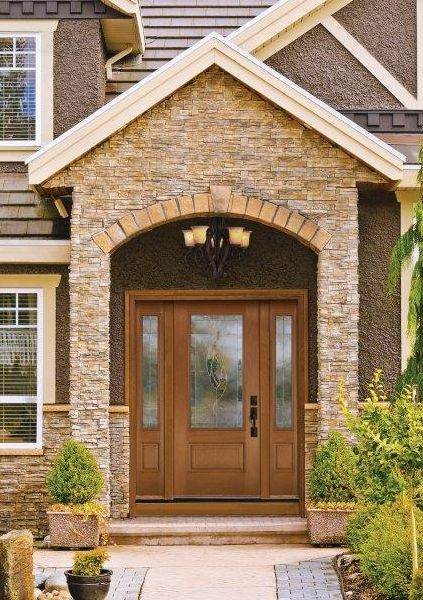Tuckpointing, also known as pointing or repointing, is a masonry repair technique used to replace or repair the mortar joints between bricks or stone blocks in a wall or structure. Over time, the mortar in masonry can deteriorate due to weathering, age, or other factors, leading to cracks, gaps, and weakening of the overall structure. Tuckpointing is done to restore the integrity and appearance of the masonry.
Here's how the tuckpointing process typically works:
Assessment: A masonry professional assesses the condition of the existing mortar joints to determine if tuckpointing is necessary. They look for cracks, crumbling mortar, and other signs of deterioration.
Removal of Old Mortar: The old, deteriorated mortar is carefully removed from between the bricks or stone blocks using tools such as chisels and grinders. It's essential to remove enough of the old mortar to ensure a proper bond with the new mortar but without damaging the masonry units.
Cleaning: Once the old mortar is removed, the area is cleaned to remove any dust, debris, or loose material. This ensures that the new mortar will adhere properly to the masonry units.
Preparing the Mortar: A mortar mix is prepared to match the color and composition of the original mortar as closely as possible. This mix typically includes sand, cement, and sometimes lime. Pigments can be added to achieve the desired color.
Application of New Mortar: The new mortar is carefully applied to the cleaned and prepared joints using specialized tools. A narrow groove is created in the center of the joint, and the new mortar is pressed into this groove. This process gives the appearance of a thin, neat line of mortar between the masonry units, which is what gives tuckpointed masonry its distinctive appearance.
Finishing: Excess mortar is cleaned off the masonry surface, leaving a clean and uniform appearance. The texture and appearance of the new mortar should match that of the surrounding masonry.
Tuckpointing serves both functional and aesthetic purposes. Functionally, it restores the structural integrity of the masonry by providing a solid, weather-resistant bond between the bricks or stone blocks. Aesthetically, it can improve the appearance of the masonry by creating the illusion of well-maintained mortar joints even if the original mortar has deteriorated.
Overall, tuckpointing is a skilled trade and is typically carried out by experienced masons or professionals who specialize in masonry restoration. It is an essential maintenance practice for preserving the longevity and appearance of buildings with masonry construction.
A flat roof is a type of roofing design characterized by its minimal slope or pitch. Unlike sloped roofs, which have a noticeable angle or incline, flat roofs have a very slight slope or may even appear entirely flat when viewed from a distance. While they are not perfectly flat and usually have a small slope for water drainage, this slope is generally much less pronounced than that of sloped roofs.
Flat roofs are commonly used in both residential and commercial buildings, as well as in industrial and institutional structures. They offer certain advantages, such as cost-effectiveness, ease of installation, and the potential for additional outdoor space like rooftop gardens or terraces. However, there are also some challenges associated with flat roofs, including potential water pooling and drainage issues, which can lead to leaks if not properly designed and maintained.
To ensure proper drainage and prevent water from accumulating on a flat roof, it typically features a waterproofing membrane, insulation, and a roof deck. Proper maintenance and regular inspections are essential for the long-term performance of flat roofs to address potential issues promptly. Different types of roofing materials, such as built-up roofing (BUR), modified bitumen, single-ply membranes (e.g., EPDM, TPO, PVC), and even green or living roofs, can be used on flat roofs, depending on the building's needs and climate conditions.
Preparing your home's siding for Chicago winters is important to ensure that it can withstand the harsh weather conditions, including cold temperatures, snow, and ice. Here are some steps you can take to prepare your siding for the winter:
-
Inspect Your Siding: Before winter arrives, inspect your siding for any damage, such as cracks, chips, or loose panels. Address any issues you find, as winter weather can exacerbate existing problems.
-
Clean Your Siding: Use a power washer or a hose with a siding cleaning solution to remove dirt, mildew, and mold. Clean siding helps maintain its integrity and appearance.
-
Trim Trees and Shrubs: Trim any trees or shrubs near your home that may come into contact with your siding during heavy snow or ice accumulation. This can help prevent damage from falling branches.
-
Seal Gaps and Cracks: Inspect your siding for any gaps or cracks where cold air and moisture can enter. Use caulk or weatherstripping to seal these gaps, helping to improve energy efficiency and prevent drafts.
-
Inspect and Repair Paint or Stain: If your siding is painted or stained, check for any areas where the finish is peeling or damaged. Repaint or restain as needed to protect the siding from moisture.
-
Consider Insulation: If you have older siding or live in a particularly cold part of Chicago, consider adding insulation beneath your siding. This can help improve energy efficiency and keep your home warmer in the winter.
-
Clear Debris: Make sure that there's no debris, leaves, or other materials trapped between the siding and your home. These can trap moisture and cause damage over the winter.
-
Protect Against Ice Dams: Ice dams can form on your roof and potentially damage your siding as melting snow refreezes. Make sure your attic is well-insulated and ventilated to prevent ice dams.
-
Snow Removal: After a heavy snowfall, it's important to clear snow away from your siding to prevent moisture from seeping in. Use a roof rake or snow blower to safely remove snow.
-
Consider Storm Windows or Shutters: Storm windows and shutters can add an extra layer of protection to your siding, reducing heat loss and providing additional insulation.
-
Keep Gutters Clean: Properly functioning gutters and downspouts can help direct water away from your siding. Make sure they are clean and in good working order.
-
Regular Maintenance: Perform regular maintenance on your siding throughout the winter, checking for any issues and addressing them promptly.
-
Professional Inspection: If you're unsure about the condition of your siding or need assistance with any repairs or improvements, consider hiring a professional siding contractor to inspect and prepare your siding for winter.
By taking these steps to prepare your siding for Chicago winters, you can help protect your home and maintain its appearance and integrity throughout the cold season.




